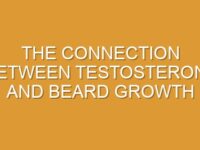-
- The Role of Genetics in Beard Growth: Understanding the Genetic Factors Behind Facial Hair Development
- Genetic Variations and Beard Growth Patterns: Exploring the Influence of Genes on Beard Thickness, Length, and Density
- Genetic Testing for Beard Growth: Can DNA Analysis Help Predict and Enhance Facial Hair Growth?
Table of Contents
- The Role of Genetics in Beard Growth: Understanding the Genetic Factors Behind Facial Hair Development
- Genetic Variations and Beard Growth Patterns: Exploring the Influence of Genes on Beard Thickness, Length, and Density
- Genetic Testing for Beard Growth: Can DNA Analysis Help Predict and Enhance Facial Hair Growth?
The Role of Genetics in Beard Growth: Understanding the Genetic Factors Behind Facial Hair Development
Have you ever wondered why some men can grow a full, thick beard effortlessly, while others struggle to grow even a few patches of facial hair? The answer lies in genetics. Genetics play a significant role in determining the growth and development of facial hair. Understanding the genetic factors behind beard growth can help you better understand your own beard journey and what you can do to enhance it.
Genetics is the study of genes and how they are passed down from one generation to another. These genes contain the instructions for our physical characteristics, including our facial hair. The genes responsible for beard growth are primarily located on the X and Y chromosomes. The Y chromosome, in particular, plays a crucial role in determining whether a man will be able to grow a beard or not.
One of the key genetic factors that influence beard growth is the presence of androgen receptors in the hair follicles. Androgens, such as testosterone, are hormones that are responsible for the development of male characteristics, including facial hair. The androgen receptors in the hair follicles determine how sensitive they are to these hormones. If a man has a high number of androgen receptors in his facial hair follicles, he is more likely to have a thick, full beard.
Another genetic factor that affects beard growth is the level of 5-alpha-reductase enzyme activity. This enzyme converts testosterone into dihydrotestosterone (DHT), which is a more potent form of the hormone. DHT is known to stimulate the growth of facial hair. Men with higher levels of 5-alpha-reductase activity are more likely to have robust beard growth.
In addition to these genetic factors, the timing of beard growth is also influenced by genetics. The onset and rate of beard growth are determined by the activation of certain genes during puberty. Some men may start growing facial hair earlier than others due to genetic variations in these genes.
While genetics play a significant role in beard growth, it doesn’t mean that you are completely at the mercy of your genes. There are several things you can do to enhance your beard growth, even if you have less favorable genetic factors.
Firstly, maintaining a healthy lifestyle is crucial for optimal beard growth. Eating a balanced diet rich in vitamins and minerals, exercising regularly, and getting enough sleep can all contribute to healthy hair growth, including facial hair.
Secondly, taking care of your skin and beard can promote better growth. Keeping your skin clean and moisturized can create a favorable environment for hair follicles to thrive. Using beard oils or balms can also help nourish the hair and stimulate growth.
Lastly, consider using beard growth products that contain ingredients known to promote hair growth, such as biotin, vitamin E, and minoxidil. These products can help stimulate dormant hair follicles and promote thicker, fuller beard growth.
In conclusion, genetics play a significant role in determining beard growth. Understanding the genetic factors behind facial hair development can help you better understand your own beard journey. While genetics may set the foundation for your beard growth, there are steps you can take to enhance it. By maintaining a healthy lifestyle, taking care of your skin and beard, and using beard growth products, you can optimize your beard growth potential and achieve the beard of your dreams.
Genetic Variations and Beard Growth Patterns: Exploring the Influence of Genes on Beard Thickness, Length, and Density
Have you ever wondered why some men can grow a thick, full beard in a matter of weeks, while others struggle to grow even a few patches of facial hair? The answer lies in our genetics. Our genes play a significant role in determining the thickness, length, and density of our beards. In this article, we will explore the influence of genes on beard growth patterns and discuss what you can do to enhance your beard growth.
Genetic variations are responsible for the wide range of beard growth patterns we see among men. These variations can be attributed to differences in the androgen receptor gene, which is responsible for the development of male secondary sexual characteristics, including facial hair. Some men have a higher number of androgen receptors in their facial hair follicles, which allows for faster and thicker beard growth. On the other hand, men with fewer androgen receptors may experience slower and sparser beard growth.
Another gene that impacts beard growth is the dihydrotestosterone (DHT) gene. DHT is a hormone derived from testosterone that plays a crucial role in the development of facial hair. The activity of the DHT gene determines the sensitivity of hair follicles to DHT. Men with higher DHT activity tend to have thicker and denser beards, while those with lower DHT activity may have thinner and less dense facial hair.
While genetics play a significant role in determining beard growth patterns, there are certain things you can do to enhance your beard growth. One of the most effective ways is to maintain a healthy lifestyle. Eating a balanced diet rich in vitamins and minerals, such as vitamin A, C, and E, can promote hair growth. Additionally, regular exercise improves blood circulation, which can stimulate hair follicles and promote beard growth.
Another way to enhance beard growth is by taking care of your skin. Keeping your facial skin clean and moisturized creates a healthy environment for hair follicles to thrive. Exfoliating regularly removes dead skin cells and unclogs hair follicles, allowing for better beard growth. Using a beard oil or balm can also nourish the hair follicles and promote healthy beard growth.
If you’re looking for a more immediate solution, you may consider using minoxidil. Minoxidil is a topical medication that stimulates hair growth and is commonly used to treat male pattern baldness. Applying minoxidil to your beard area can promote beard growth, especially in areas where hair is sparse. However, it’s important to note that minoxidil may not work for everyone, and results may vary.
In conclusion, genetics play a significant role in determining beard growth patterns. Genetic variations in the androgen receptor and DHT genes can influence the thickness, length, and density of facial hair. While you cannot change your genetics, there are steps you can take to enhance your beard growth. Maintaining a healthy lifestyle, taking care of your skin, and considering options like minoxidil can all contribute to a fuller, thicker beard. So embrace your genetics, and with a little care and patience, you can achieve the beard of your dreams.
Genetic Testing for Beard Growth: Can DNA Analysis Help Predict and Enhance Facial Hair Growth?
Have you ever wondered why some men can grow a full, thick beard effortlessly, while others struggle to grow even a few patches of facial hair? The answer lies in genetics. Genetics play a significant role in determining the growth and thickness of a man’s beard. But fear not, because there are ways to enhance your beard growth, and genetic testing can help you understand your beard potential.
Genetic testing for beard growth has gained popularity in recent years. By analyzing your DNA, scientists can identify specific genetic markers that are associated with beard growth. This information can help predict your beard potential and provide insights into the factors that may be limiting your beard growth.
One of the key genetic factors that influence beard growth is the presence of androgen receptors. Androgen receptors are proteins that bind to hormones like testosterone, which is essential for beard growth. Some men have a higher number of androgen receptors in their facial hair follicles, making them more responsive to testosterone and promoting faster and thicker beard growth.
Another genetic factor that affects beard growth is the activity of certain genes involved in hair follicle development. These genes control the production of proteins that are necessary for hair growth. Variations in these genes can influence the rate at which your facial hair grows and the thickness of your beard.
Understanding your genetic predisposition for beard growth can help you set realistic expectations. If your genetic test reveals that you have a low number of androgen receptors or variations in genes that affect hair follicle development, it may explain why you struggle to grow a full beard. However, it’s important to remember that genetics is not the only factor at play. Hormonal imbalances, stress, and lifestyle choices can also impact beard growth.
So, what can you do if your genetic test reveals that you have a lower beard potential? The good news is that there are ways to enhance your beard growth, regardless of your genetic makeup. Here are a few tips to help you achieve the beard of your dreams:
1. Take care of your skin: A healthy beard starts with healthy skin. Keep your face clean and moisturized to create an optimal environment for beard growth.
2. Eat a balanced diet: Proper nutrition is crucial for hair growth. Include foods rich in vitamins, minerals, and proteins, such as fruits, vegetables, lean meats, and nuts, in your diet.
3. Exercise regularly: Regular exercise improves blood circulation, which can promote hair growth. Incorporate cardiovascular exercises and strength training into your routine.
4. Manage stress: Stress can disrupt hormone levels and inhibit beard growth. Find healthy ways to manage stress, such as practicing meditation, yoga, or engaging in hobbies you enjoy.
5. Consider beard growth products: There are various beard growth products available in the market, such as beard oils, balms, and supplements. These products can help nourish your facial hair and promote growth.
Remember, genetics may play a significant role in beard growth, but it’s not the only determining factor. By understanding your genetic predisposition and adopting healthy habits, you can enhance your beard growth and achieve the beard you’ve always wanted. So, embrace your genetics, take care of your beard, and let it grow!






















0 Comments